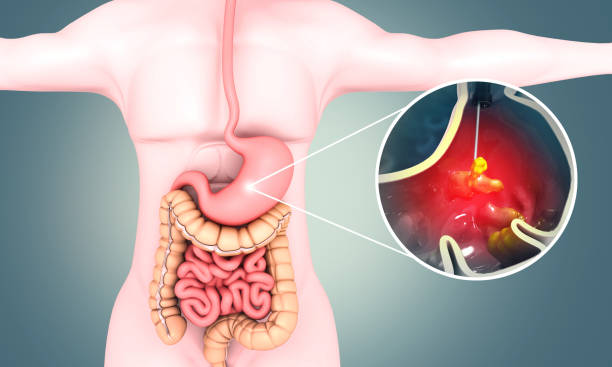Make an Appointment
What are stomach ulcers? What causes stomach ulcers? Stomach ulcers are usually caused by an infection of Helicobacter pylori bacteria, or from taking anti-inflammatory medicines (NSAIDs), such as ibuprofen and aspirin. These can break down the stomach’s defence against the acid it produces to digest food, allowing the stomach lining to become damaged and an ulcer to form.
- H. pylori infection is a common infection to have and it’s usually harmless for most people. But sometimes it causes ulcers in the stomach (gastric ulcer) or the duodenum (duodenal ulcer). Some people are more affected than others.
- Anti-inflammatory medicines or NSAIDs – There are medicines widely used to treat pain, high temperature (fever) and inflammation (swelling). Some commonly used NSAIDs include ibuprofen, aspirin, naproxen and diclofenac. Many people take NSAIDs without having any side effects. But there’s always a risk the medication could cause problems, such as stomach ulcers, particularly if taken for a long time or at high doses. It is suggested to not take NSAIDs if you currently have or have had a stomach ulcer.
- A condition known as Zollinger – Ellison syndrome can cause stomach and intestinal ulcers by increasing the body’s production of acid. This syndrome is suspected to cause less than one per cent of all peptic ulcers.
Some people don’t have the above two problems then what causes stomach ulcers? Many studies have found that lifestyle factors, like spicy foods, stress and alcohol, cause stomach ulcers. It’s thought that smoking increases your risk of developing stomach ulcers and may make treatment less effective.
What is a stomach ulcer? What causes stomach ulcers?
Stomach ulcers, which are also known as gastric ulcers, are painful sores in the stomach lining
. Stomach ulcers are a type of peptic ulcer disease. Peptic ulcers are any ulcers that affect both the stomach and small intestines. Stomach ulcers occur when the thick layer of mucus that protects your stomach from digestive juices is reduced. This allows the digestive acids to eat away at the tissues that line the stomach, causing an ulcer. They may be easily cured, but they can become severe without proper treatment.
Several symptoms are associated with stomach ulcers. The severity of the symptoms depends on the severity of the ulcer. The most common symptom is a burning sensation or pain in the middle of your abdomen between your chest and belly button. Typically, the pain will be more intense when your stomach is empty, and it can last for a few minutes to several hours. Other common signs and symptoms of ulcers include a dull pain in the stomach, weight loss, not wanting to eat because of pain, nausea or vomiting, bloating, feeling easily full, burping or acid reflux, heartburn, which is a burning sensation in the chest. Pain that may improve when you eat, drink, or take antacids or anaemia, whose symptoms can include tiredness, shortness of breath, or paler skin, dark, tarry stools. Visit a doctor if you have any symptoms of a stomach ulcer. Even though discomfort may be mild, ulcers can worsen if they aren’t treated. Bleeding ulcers can become life-threatening.
Diagnosis and treatment will depend on your symptoms and the severity of your ulcer. Treatment will vary depending on the cause of your ulcer. Most ulcers can be treated with a prescription from your doctor, but in rare cases, surgery may be required. It’s important to promptly treat an ulcer. Talk to your doctor to discuss a treatment plan. If you have an actively bleeding ulcer, you’ll likely be hospitalized for intensive treatment with endoscopy and IV ulcer medications. You may also require a blood transfusion. Eating a healthful diet can benefit your intestinal tract and overall health. In general, it’s a good idea to eat a diet with lots of fruits, vegetables, and fibre.


9 Comments
Pingback: What causes stomach ulcers? – Sujata Birla Hospital
Pingback: Benefits of Meditation | Birla Healthcare
Pingback: Norovirus Infection | Sujata Birla Hospital
Pingback: Ayurvedic Remedies For Gas And Acidity – Birla Ayurveda
Pingback: (Helicobacter Pylori) H. Pylori Infection: Symptoms and Causes | Sujata Birla Hospital
Pingback: Stomach Cancer Awareness Month | Sujata Birla Hospital
Pingback: Ayurvedic Home Remedies For Mouth Ulcer – Birla Ayurveda
Pingback: Honey And Ghee In Ayurveda – Birla Ayurveda
Pingback: Simple Home Remedies For Loose Motions | Sujata Birla Hospital